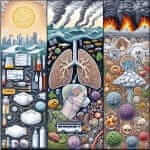Climate change and its influence on weather patterns is a hot topic in current affairs and a frequent subject in IELTS Writing Task 2. Understanding the science behind this phenomenon and its global implications is essential for crafting a well-informed and compelling essay. This article provides a sample IELTS essay question on this topic, a band-8 model answer, and key vocabulary to help you ace this essay type.
Sample IELTS Essay Question
Many people believe that climate change is primarily responsible for the increasingly unpredictable and extreme weather events we are witnessing globally. To what extent do you agree or disagree with this view?
Give reasons for your answer and include any relevant examples from your own knowledge or experience.
Essay Analysis
This essay question requires you to discuss the link between climate change and extreme weather events. It falls under the “opinion” category, requiring you to present a clear stance while acknowledging both sides of the argument.
Model Essay
Climate change has emerged as a pressing global concern, with its far-reaching consequences increasingly evident in our daily lives. One of the most alarming manifestations of this phenomenon is the surge in unpredictable and extreme weather events worldwide. While some argue that these events are simply natural variations in weather patterns, I firmly believe that climate change plays a significant role in their increasing frequency and intensity.
The scientific consensus on climate change is clear: human activities, primarily the burning of fossil fuels, are releasing greenhouse gases into the atmosphere, trapping heat and causing the planet to warm. This warming effect has profound implications for weather patterns. For instance, warmer temperatures lead to increased evaporation, which in turn fuels more powerful storms and hurricanes. Furthermore, the disruption of the jet stream, a band of strong winds in the upper atmosphere, due to a warming Arctic can lead to prolonged periods of extreme heat, droughts, and even intense cold spells in certain regions.
 Climate Change Effects
Climate Change Effects
Examples of climate change-induced extreme weather events abound. The devastating wildfires that have ravaged Australia and California in recent years are exacerbated by prolonged droughts and hotter temperatures, both consequences of climate change. Similarly, the increased frequency and intensity of hurricanes in the Atlantic Ocean can be attributed to warmer ocean temperatures, a direct result of global warming. These events not only cause widespread destruction and economic loss but also pose serious threats to human lives and ecosystems.
In conclusion, while it is true that weather patterns have always exhibited some degree of variability, the scientific evidence overwhelmingly points to climate change as a major driver of the unprecedented and extreme weather events we are witnessing today. Urgent action to mitigate greenhouse gas emissions and adapt to the changing climate is crucial to avert the worst consequences of this global crisis. (Word count: 295)
Writing Tips
- Structure: Follow a clear structure – Introduction, Body Paragraph 1 (Agree), Body Paragraph 2 (Disagree), Conclusion.
- Topic Sentences: Begin each body paragraph with a clear topic sentence that outlines the main point of the paragraph.
- Supporting Evidence: Use specific examples and factual information to support your claims.
- Vocabulary: Use a range of vocabulary related to climate change and weather patterns.
- Grammar and Accuracy: Pay attention to grammar, spelling, and punctuation.
Vocabulary
- Climate Change (n.) /ˈklaɪmət ˌtʃeɪndʒ/: a change in global or regional climate patterns, attributed largely to the increased levels of atmospheric carbon dioxide.
- Extreme Weather (n.) /ɪkˈstrim ˈweðər/: weather conditions that are significantly different from the average or usual weather pattern.
- Greenhouse Gases (n.) /ˈɡrinhaʊs ˌɡæsɪz/: gases that contribute to the greenhouse effect by absorbing infrared radiation.
- Fossil Fuels (n.) /ˈfɒsɪl ˌfjuːəlz/: fuels formed by natural processes, such as anaerobic decomposition of buried dead organisms.
- Jet Stream (n.) /ˈdʒɛt ˌstrim/: a narrow band of strong wind in the upper atmosphere.
- Drought (n.) /draʊt/: a prolonged period of abnormally low rainfall, leading to a shortage of water.
- Exacerbate (v.) /ɪɡˈzæsə(r)beɪt/: to make a problem, bad situation, or negative feeling worse.
Conclusion
Discussing the effects of climate change on weather patterns is a complex task, but by using the provided structure, vocabulary, and tips, you can craft a well-structured and informative IELTS essay. Remember to practice regularly, familiarize yourself with relevant vocabulary, and stay updated on current events related to this crucial global issue.


